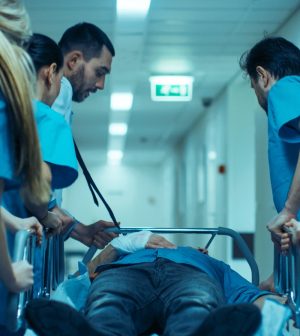- Could Your Grocery Store Meat Be Causing Recurring UTIs?
- Are You Making This Expensive Thermostat Error This Winter?
- Recognizing the Signs of Hypothyroidism
- 10 Strategies to Overcome Insomnia
- Could Artificial Sweeteners Be Aging the Brain Faster?
- Techniques for Soothing Your Nervous System
- Does the Water in Your House Smell Funny? Here’s Why
- Can a Daily Dose of Apple Cider Vinegar Actually Aid Weight Loss?
- 6 Health Beverages That Can Actually Spike Your Blood Sugar
- Treatment Options for Social Anxiety Disorder
Trained Peers as Good as Social Workers at Preventing Opioid Overdoses

Support provided by someone who has personally lived with addiction is an effective way to follow-up with ER patients after an opioid overdose, new research shows.
Patients who have had a non-fatal overdose are at great risk of a fatal overdose in the future, and more 1 in 4 high-risk patients in Rhode Island has a non-fatal opioid overdose within 18 months of leaving the hospital.
A controlled trial involving more than 600 high-risk ER patients found that follow-up support from trained peer recovery specialists was as effective as that provided by a licensed social worker.
“Interviewing and intervention techniques informed by lived experience were as effective as those informed by social work theory and practice,” Brown University researchers said.
Certified peer recovery support specialists not only provide referrals for services as patients leave the ER, they also offer follow-up support for up to 90 days. That includes teaching patients how to prevent an overdose, helping them overcome barriers to treatment and recovery, and encouraging them to stick with it.
Support from social workers typically ends when the patient leaves the ER.
“The results of our trial strongly suggest that trained peers, and the sort of sustained support they deliver, are just as effective at preventing opioid overdoses as the support offered by traditionally trained clinical social workers,” said lead study author Laura Chambers, an assistant professor at Brown University School of Public Health.
The trial included 648 emergency room patients deemed at high risk of opioid overdose. Of those, 325 received support from a licensed clinical social worker. The rest were assigned a peer recovery support specialist. All but 15 completed the assigned ER intervention.
Within 18 months of follow-up, 81 members of the peer recovery support group had a non-fatal opioid overdose, compared to 95 who had social worker support. There was no significant difference between the groups in fatal overdoses.
The findings were published July 11 in the journal Addiction.
“Non-fatal opioid overdoses are an important predictor of future overdose death, so when someone presents at an emergency room with an overdose or a recent history of overdose, there is an opportunity to offer risk-reduction services,” Chambers said in a journal news release.
More information
If you or someone you know needs help with opioid addiction, call 800-662-HELP. The free, confidential treatment referral and information service is available 24/7, 365 days a year.
SOURCE: Society for the Study of Addiction, news release, July 11, 2024
Source: HealthDay
Copyright © 2026 HealthDay. All rights reserved.










